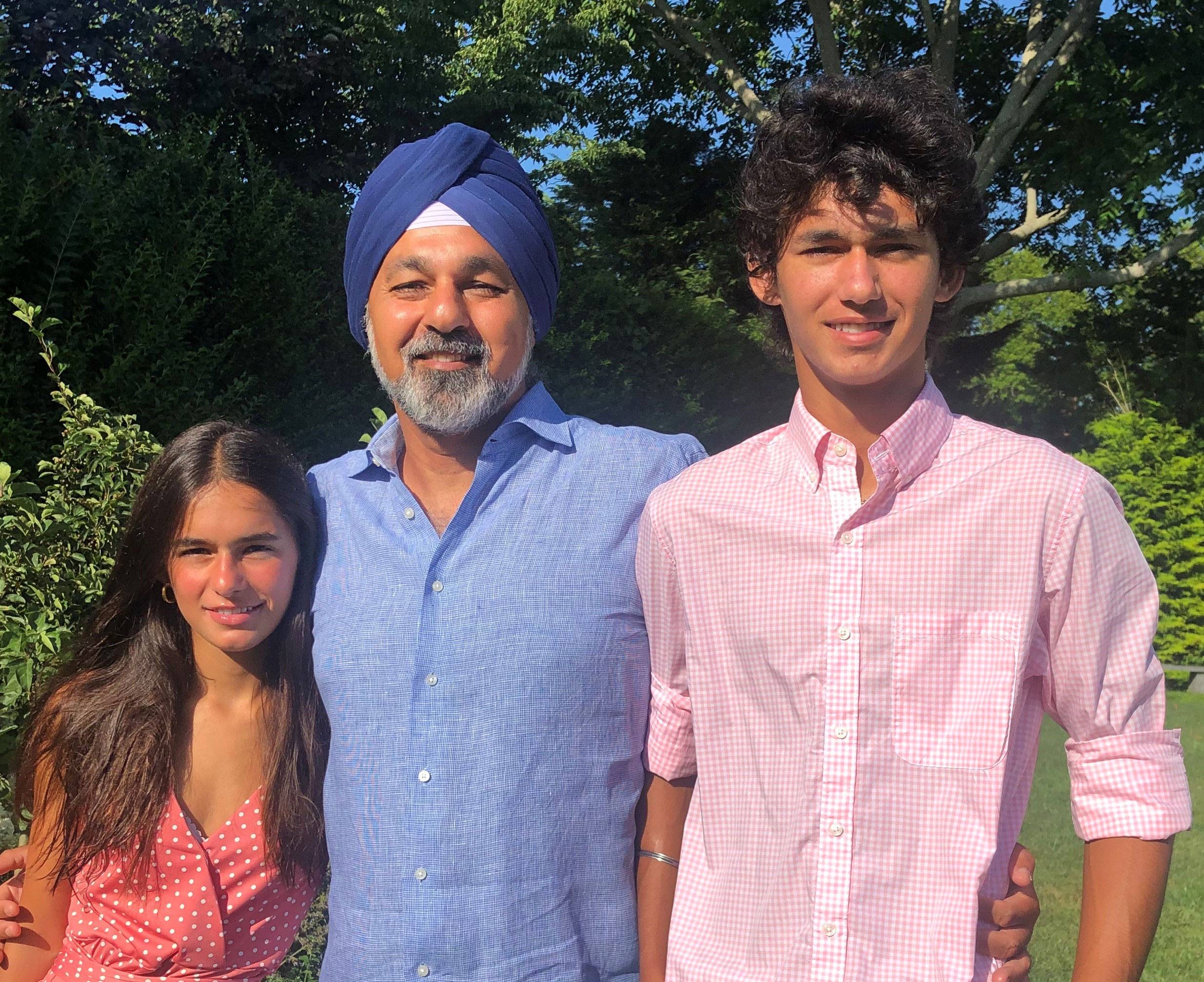September 4, 2020
by Molly Sharlach, Office of Engineering Communications

Illustration by Matilda Luk, Office of Communications
After scattering to homes across the country and around the world this spring, a growing group of Princeton students have used video conferencing not only to continue coursework and keep up social connections, but also to support the learning and development of younger students in the tri-state area.
Since the launch of the Princeton Online Tutoring Network (POTN) in April, volunteer tutors from the University community have led more than 600 virtual tutoring sessions with K-12 students from underrepresented groups. Connecting with youth participants through partner organizations that offer academic help and enrichment, tutors have focused on subjects such as math, science and reading, as well as study skills and college preparation.
The tutoring network is the brainchild of computer science professor Jaswinder Pal (JP) Singh, who hatched the idea together with his teenage son and daughter. Singh’s children, Kabir and Sophia, were discussing with him how the COVID-19 pandemic was disproportionately disrupting education for low-income students of color — a disruption from which it would be difficult to recover. As the three explored different ideas for how they could help, they thought perhaps Singh could mobilize Princeton’s resources and culture of service to help students fare better.
“At Princeton we have this asset, which is people who have an orientation toward teaching and learning,” said Singh, who directs Princeton’s Program in Applications of Computing. “That made me think that a volunteer tutoring network would be a great match between the urgent needs in society that were heightened as a result of the pandemic, and the assets and the abilities that we can bring to bear to help make a real difference in people’s lives.”
Singh first reached out to Provost Deborah Prentice, who connected him with Kimberly de los Santos, director of the John H. Pace, Jr. ’39 Center for Civic Engagement. Through her work with Community House and other youth-focused programs, the Pace Center’s associate director Charlotte Collins knew a dedicated group of students who had been volunteering as in-person tutors before leaving campus in March — a natural starting point for making Singh’s idea a reality.

Computer science professor Jaswinder Pal (JP) Singh (center) with his children, Sophia and Kabir. Professor Singh helped create the Princeton Online Tutoring Network after a discussion with his children about the COVID-19 pandemic’s disproportionate effects on education for low-income students of color. Photo by Silvia Ercolani
Calls for volunteers were sent to these students and to subsets of others across the University in early April. More than 400 undergraduates, graduate students and other community members responded, including about two dozen who were interested in helping to organize the tutoring effort.
“That was astounding to me,” said Singh. “It was heartwarming to see how much people wanted to help.”
Following online training and matching tutors with youth participants’ schedules and areas of need, 43 tutors took part in a six-week spring pilot program. This initial group of volunteers included those who had undergone background checks prior to the pandemic; the ability to bring new tutors on board was temporarily slowed because courts around the country were closed.
The tutors offered academic support and mentoring for middle and high school students through Trenton Arts at Princeton, a University-sponsored community outreach program; and through partnerships with Corner House, a Princeton-based program for the treatment and prevention of alcohol and drug addiction; and Publicolor, a youth development program in New York City, where Singh and his family live.
In accordance with the University’s policy for programs involving minors, POTN tutoring sessions include two tutors for each student or group of students, with all tutors participating in a background check process and training to support their work with POTN.
In addition to ensuring the protection of the youth participants, this arrangement was “very helpful for the student, because we both were able to offer our own insight and kind of check each other while we were helping her,” said Angelica Qin, a sophomore at Princeton who tutored a high school student in Mandarin Chinese through POTN’s partnership with Publicolor.
While students’ learning was inevitably impacted by the loss of in-person school instruction and of face-to-face tutoring sessions, POTN presented “a perfect opportunity” to support young people through the challenges of staying at home and virtual learning, said Filomeno Cuino, outreach coordinator for Corner House. Participants were “able to actually see their tutors, talk to their tutors — it was fulfilling this need for them” while they could not be in a real classroom.
In addition to subjects such as math, biology and English, three Corner House participants got help preparing for the SAT college admissions test from two Princeton undergraduates. The group reviewed practice problems and test-taking strategies, “and we also just talked with them about what was going on in their lives,” said tutor Marisa De Silva, a member of Princeton’s Class of 2020. “It’s been a while since I was in their shoes, but I remember being there, and I think it was good for them to be able to talk to us about our experiences.”
This summer, POTN added five new community partner organizations: Princeton Public Schools, Boys & Girls Clubs of Mercer County; and Trenton’s Get SET after-school program, Capital Area YMCA, and Young Scholars’ Institute. The program expanded to 115 tutors and 122 youth participants, and seven Princeton undergraduates and one graduate student were hired to serve as site coordinators through the Pace Center’s Princeton RISE anti-racist grant initiative.
The Princeton RISE interns helped streamline the process of matching community partners and their participants with POTN tutors. “Their enthusiasm and energy were critical in making this happen and grow,” said Singh.
POTN “has been built in such a way that it can meet unique needs,” said the Pace Center’s Collins. “No two young people are the same in what they need to be successful. We’re able to tailor our tutoring so it can be a supplement to what an existing organization is doing.”
For the Young Scholars’ Institute, providing tutoring through POTN continues a longstanding relationship between the University and the nonprofit, which has supported Trenton-area youth with educational, cultural and recreational activities since 1990.
“I am very concerned about what this current challenge in our country is doing to kids,” said Jerri Morrison, the institute’s founder and executive director. “We have many students who were not performing on grade level in reading and math before this happened, and now they’re missing so much. We have to do whatever we can to help them bridge these gaps.”
While math tutoring was the greatest need for Young Scholars’ Institute students this summer, some tutors also facilitated virtual book clubs. Fourth- and fifth-grade reading selections included “Memphis, Martin, and the Mountaintop” by Alice Faye Duncan, a historical fiction picture book about the 1968 Memphis sanitation strike. Middle schoolers read “Leon’s Story,” the memoir of an African American boy growing up in a sharecropping family in 1940s North Carolina. High school students read “I Know Why the Caged Bird Sings,” the first volume of poet Maya Angelou’s autobiography.
“We chose books that would help [students] understand what life was like many years ago for poor people, for people of color in this country,” said Morrison. “Through these books, they had great discussions” about subjects like sexism, classism and racism. “I think we added immensely to their summer.”
Sabrina Sequeira, a senior and summer Princeton RISE intern who served as site coordinator for the Capital Area YMCA, said the Princeton students’ connections with the youth participants had benefits beyond academic support.
On the last day of summer tutoring, the fifth- to eighth-graders in the YMCA’s in-person camp program gathered for a virtual conversation with Sequeira and two of the tutors about their pathways to college and experiences at Princeton. “Many of their scholars are interested in applying to Ivy League schools, and even though they’re still young, it was good for us to share advice that we would give to our younger selves,” she said.
After building a dedicated team of staff and volunteers in just a few short months, POTN is keen to help more students through additional community partners. The network is also planning a homework help line to support students in meeting the challenges of at-home learning on a more short-term, informal basis.
“There are many different directions this can go in: mentoring, asynchronous help, curriculum development, peer-to-peer learning,” said Singh. “While we have to do it in a careful and curated way, the demand and the volunteers are clearly there, and this can become very big over time. We hope that this will last well beyond the pandemic and become a part of Princeton that helps a large number of people in meaningful ways.”